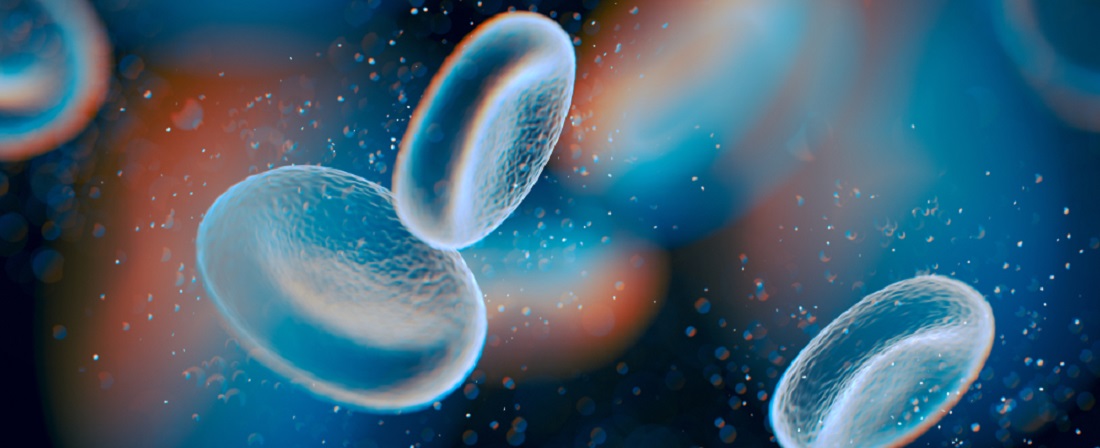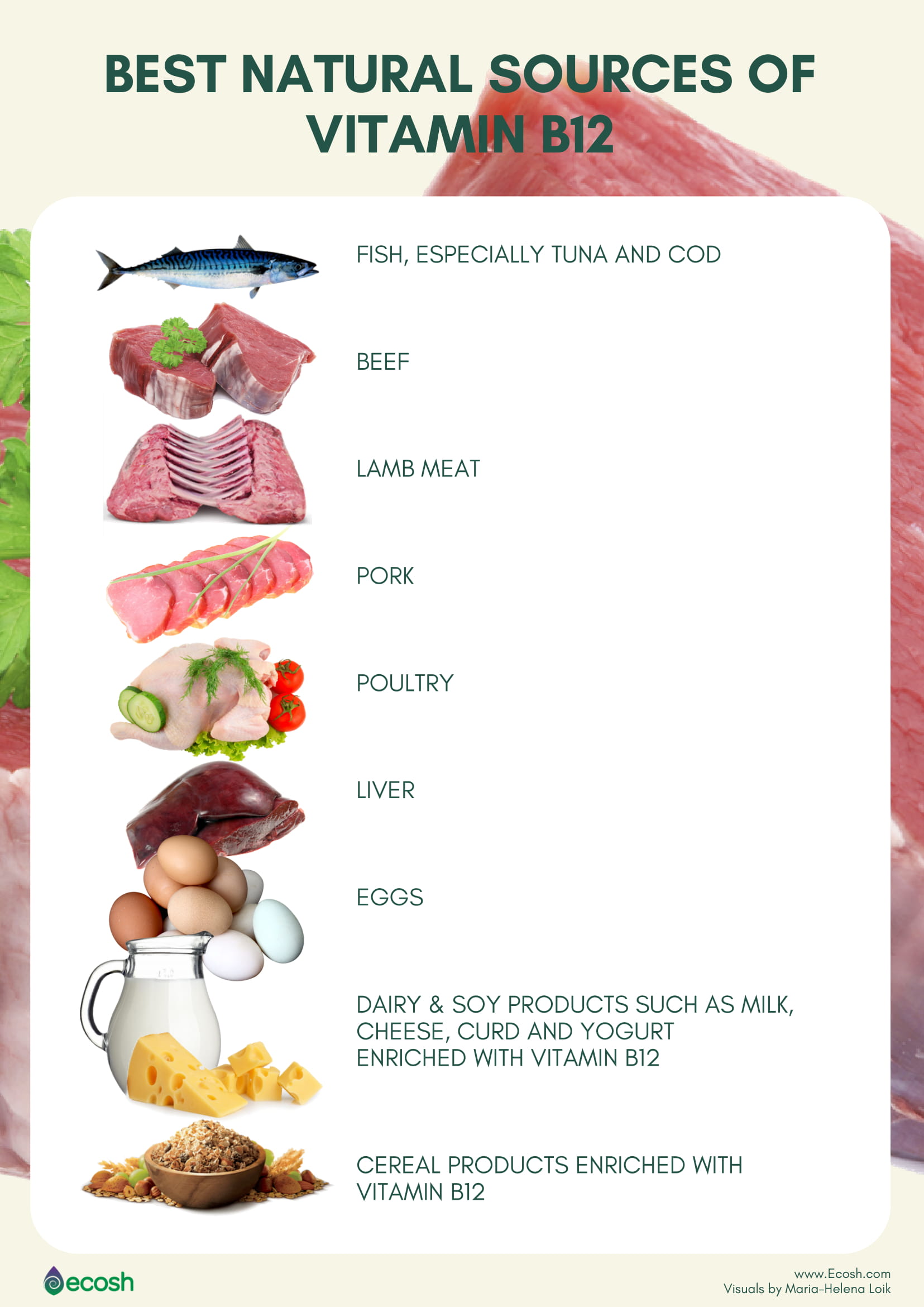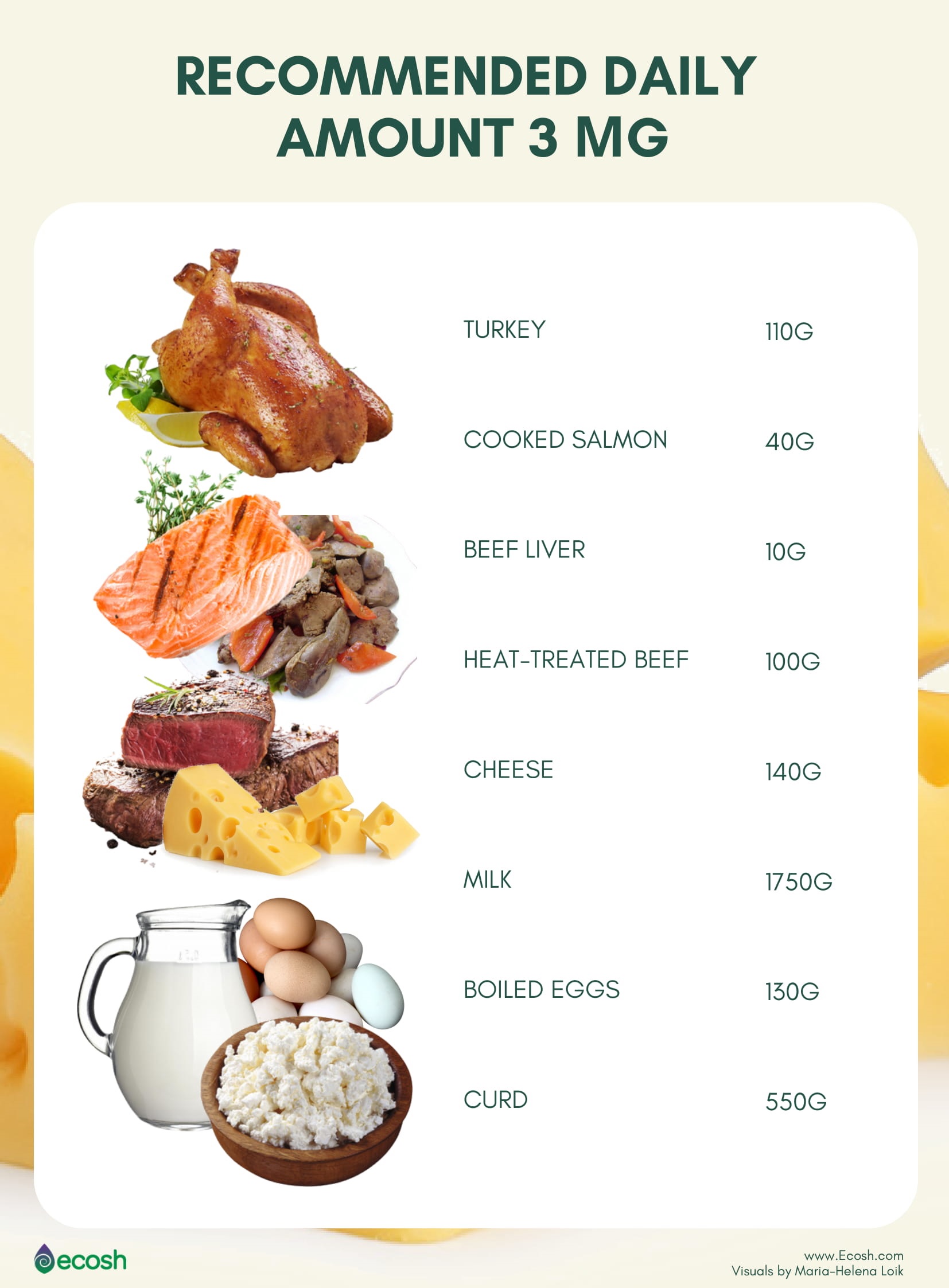Vitamin B12 is completely unique. It is the only vitamin that contains a mineral called cobalt, so B12 is also called cobalamin.
B12 is very complex vitamin and exists naturally only in animal foods.
Industrially, B12 is produced by synthesis of bacterial fermentation. However, plant origin foods contain compounds that are similar to vitamin B12, but they are inactive.
Even a slight amount of B12 deficiency in the body may lead to symptoms such as depression, anxiety, memory problems, mental disorder, and fatigue. But there are many more disturbing consequences. How to know if you might suffer from B12 deficiency and what is the best treatment? In this profound article you`ll find the answers for all those questions.
The role of Vitamin B12 in the body
- Vitamin B12 is essential for brain function and for the normal creation of blood cells in the bone marrow. The human body produces millions of red blood cells every minute. These cells, however, cannot reproduce properly without B12. So, in case you have B12 deficiency, the production of red blood cells is impaired. Thus, the deficiency of this vitamin has an important connection with the onset of anemia.
- Vitamin B12 is required for normal metabolism of amino acids.
- B12 is also required for myelin synthesis. It is a substance around the nerve fibers that protects them and allows rapid signal transmission between nerve cells. If the myelin is damaged, the transmission of the pressure pulses is disturbed. Thus, vitamin B12 is also necessary for the normal functioning of the nervous system, and the deficiency may result in neurological problems.
- B12 helps to create and regulate DNA.
- Since vitamin B12 plays a role in fatty acid synthesis and energy production, each cellular metabolism is dependent on this vitamin.
- B12 also helps the body absorb folic acid.
Vitamin B12 deficiency symptoms and consequences
Clinical symptoms of vitamin B12 deficiency evolve only after many years of reduced absorption or malnourishment. Stores of B12 in the body are between 2000 and 5000 µg, and half of it is saved in the liver.
Therefore, it mostly takes about 2-5 years to develop severe vitamin B12 deficiency. But if you try to prevent a deficit – you can’t always rely on any food supplement.
For example, you may develop B12 deficiency even if you take algae spirulina, which is said to contain different forms of B12. Unfortunately those forms are not active in the body and therefore not absorbed. B12 deficiency can cause even irreversible damage, especially in the nervous system and brain.
Symptoms
- Even a small amount of B12 deficiency in the body can cause symptoms such as depression, anxiety, mental disorder, memory problems and fatigue. However, these symptoms alone are not enough to diagnose B12 deficiency in the body.
- Initial symptoms may also include constipation, loss of appetite, and weight loss.
- As the symptoms worsen, neurological changes such as weakness, numbness and/or tingling in the hands and feet, and imbalance occur.
- Infants who suffer from B12 deficiency may experience tremors (facial), reflex problems, irritation and eating disorders. When you neglect vitamin deficiency – eventually growth problems.
- B12 deficiency poses a serious risk to the nervous system and to the brain, so permanent damage may occur. People with B12 deficiency have an increased risk of developing psychosis, mania and dementia.
- In addition, B12 has been associated with macrocytic, megaloblastic anemia and/or neurological problems mentioned above due to spinal cord, brain and optical and peripheral nervous degeneration.
- Vitamin B12 deficiency can also cause anemia. In this case, the symptoms are fatigue, shortness of breath and irregular heartbeat. In addition, painful mouth or tongue, weight loss, pale or yellowish skin, menstrual problems and diarrhea.
- People with B12 deficiency are also more susceptible to various infections.
- If the lack of this vitamin in the body is not detected in time, the consequences may be permanent mental health impairment and paralysis.
Risk Groups
In only a few cases, human intake of B12 is disrupted by food and, for the most part, the deficiency can occur only in vegetarians who have not consumed food supplements containing vitamin B12 or foods enriched with vitamin B12.
Therefore, especially vegetarians should consume B12 dietary supplements, use the convenient nasal spray or consume B12 in injectable form to receive sufficient amounts of vitamin B12.
All the risk groups that are likely to suffer from B12 deficiency
- Vegetarians, because all the foods from which the body would receive vitamin B12 in a natural way. has been removed from their food table. Thus, vegetarians who have not consumed dietary supplements containing vitamin B12 or foods enriched with B12 are at highest risk for the deficiency and should definitely administration B12 food supplements. This is especially important if you are a pregnant woman or a nursing mother.
- Infants and children from families where such a diet pattern is followed, are also at higher risk do develop the deficiency.
- Diabetes sufferers using metformin for treatment should monitor their levels of vitamin B12 because this drug inhibits B12 absorption.
- People with a bowel disorder, sufferers of gastritis and other bowel diseases (including those who have been treated for some condition in the gut).
- Chronic alcoholism can lead to B12 deficiency because the body is no longer able to effectively absorb the necessary substances.
- Anemia sufferers. It is an autoimmune disease that affects red blood cells. Sufferers of this disease simply do not have enough proteins in their stomach to help them take this vitamin.
- For elderly, absorbing vitamin B12 from food is also difficult. This is because seniors often develop problems with the acids and stomach enzymes needed to process the vitamin.
- The loss of stomach cells that make intrinsic factor (pernicious anemia). Intrinsic factor helps the body absorb vitamin B12 in the intestine.
- Both birth control and Lng IUD can induce gut dysbiosis and B12 deficiency/anemia. You see, besides making passable stools, gut bacteria also synthesize vitamins B7 (biotin), B12, and K.
- People who have inestinal parasites. In addition to other well-known parasitic agents, e.g., Diphyllobothrium latum and Giardia lamblia, Taenia infestation can also be a cause of intestinal vitamin B12 malabsorption.
Administration and side effects
Vitamin B12 is a water-soluble vitamin as well as all other B vitamins. The human body can keep B12 in the body for up to 5 years.
Due to its low level of toxicity, there is no tolerable upper intake level (UL). Also, your body excretes the B12 it doesn’t use through your urine.
Administration
- People over 14 years of age should take 2.4 micrograms (μg) per day.
- Pregnant women should consume 2.6μg per day.
- Breastfeeding mothers should consume 2.8 μg per day.
Side effects
Excessive B12 intake has not culminated in adverse side effects, even at a daily dose of 1000 μg. However, you should consult your physician if you are taking the appropriate dietary supplements, as some medicines may affect the absorption of the B12 supplement. Such as:
- Metformin
- Proton pump inhibitor
- H2 receptor agonists
- Chloramphenicol (contained in some antibiotics) etc.
The only signs of reported side effects are where, in 2001, a person in Germany linked excessive administration of vitamin B-12 with rosacea. There have also been a few cases where the administration of excessive B12 has caused acne. Consistent excessive consumption of vitamin B12 has also been linked with an increased risk of prostate cancer.
In addition, it is important to know that if you have kidney disease, the cyanocobalamin, an injectable form of B12, is not recommended for you.
Best Natural Vitamin B12 Sources
Vitamin B12 is naturally found only in animal foods such as meat, fish, eggs and dairy products.
As mentioned above, plant foods contain only substances similar to B12, but they are inactive and cannot replace the real B12.
The best sources of vitamin B12 are:
- Beef;
- Liver;
- Pork;
- Lamb Meat;
- Poultry;
- Eggs;
- Fish, especially tuna and cod;
- Dairy products such as milk, cheese, curd and yogurt;
- Parts of cereal products enriched with vitamin B12;
- Some soy products, plant-based milk substitutes (such as soy drink, oatmeal and rice drink) and breakfast cereals which are enriched with vitamin B12 can be an important source of vitamin B12 in the vegetarian menu.
It is always better to keep the right balance in your body and get enough vitamins than to deal with the consequences of the deficiency and need treatment. You can prevent the symptoms of vitamin B12 deficiency very easily through proper nutrition or B12 dietary supplements.
Recommended Vitamin B12 daily amounts
The most powerful B12 sources are beef and lamb, and as little as 100g of sheep liver will provide 1500% of your daily B12 vitamin need.
By eating 100g of bovine liver, you have received 990% of the daily ration.
The foods listed below contain 3 µg of B12, which is the recommended daily amount:
- 10g of beef liver;
- 40g of cooked salmon;
- 100g of heat-treated/cooked beef;
- 110g turkey;
- 130g of boiled eggs;
- 140g cheese;
- 550g of curd;
- 750g of milk.
Bon Appetit!
Compiled by Maria-Helena Loik
Sources: Tartu University Hospital, Medicalnewstoday.com, Healthline.com, US National Library of Medicine
Pictures: Pixabay.com, Pexels.com








